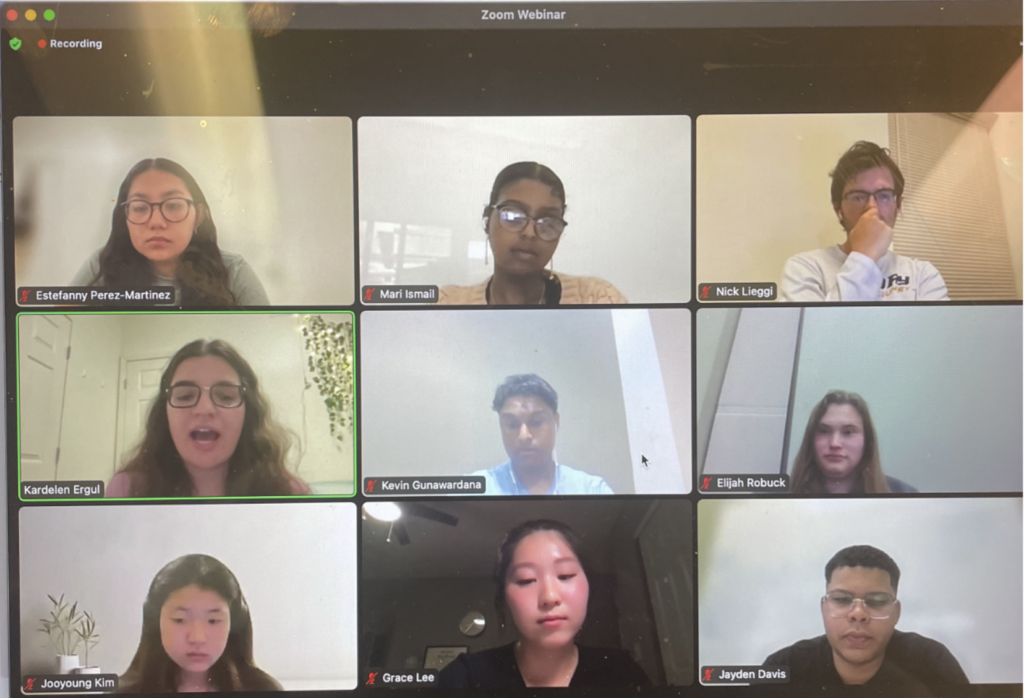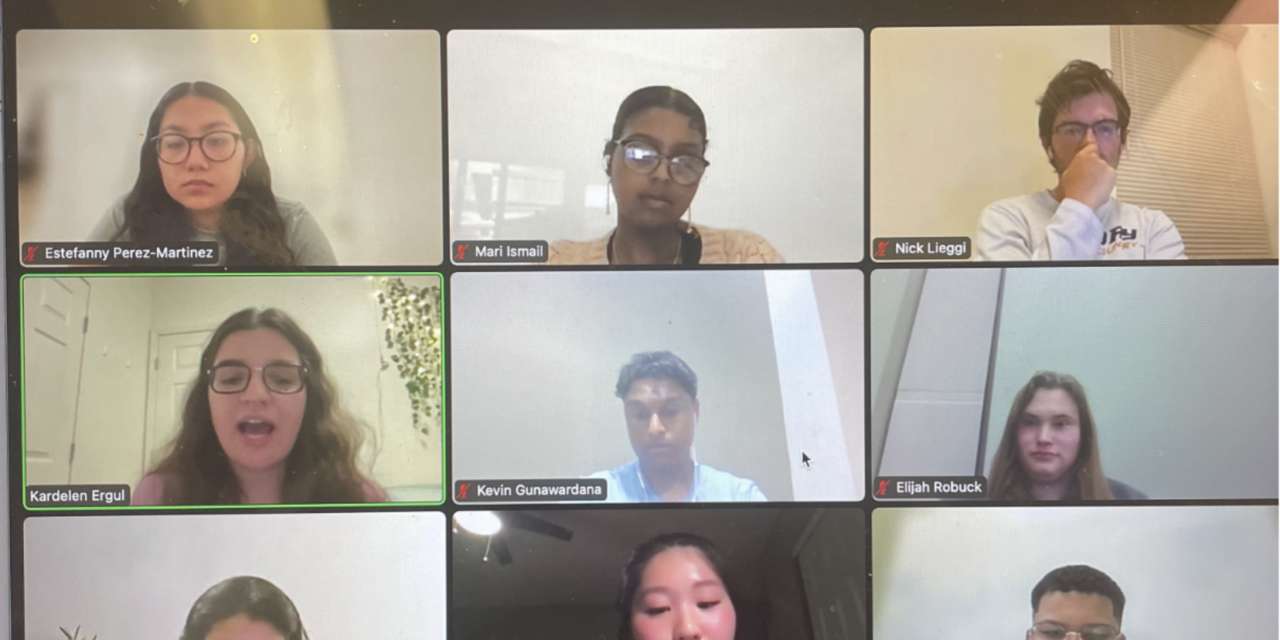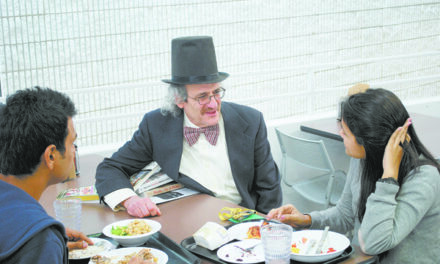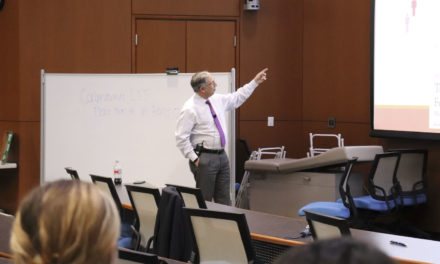The Constitutional Council heard arguments from Jayden Davis (25B), his campaign manager Elijah Robuck (26C), witnesses and members of the Elections Board in an April 4 hearing for Davis and Robuck v. Board. The hearing comes after the Davis campaign appealed the Elections Board’s decision to dismiss their allegations of election misconduct in the recent Student Government Association (SGA) presidential election.
The Constitutional Council expects to share a decision by April 9.
On March 2, Robuck filed accusations of election misconduct to the Elections Board against SGA President-elect Abigail Dubinski (25B) and SGA Vice President-elect Pranay Mamileti’s (25B) campaign. Accusations included bribery, voter intimidation, fraud and harassment. However, the Elections Board dismissed these claims in favor of allowing the 2024 SGA election results to stand during a private March 3 hearing. Davis and Robuck then filed an appeal against the Elections Board’s decision with the Constitutional Council on March 29.
During the Constitutional Council hearing, Davis and Robuck questioned Elections Board Vice Chair Ananya Singh (22Ox, 25C) about why the Elections Board did not consider giving the Dubinski and Mamileti campaign Tier Three or Tier Four violations for the accusations filed on March 2. According to the Code of Elections of the SGA, the Elections Board removes candidates from the ballot if they receive a Tier Three or Tier Four violation.
Tier Three violations are “reserved for cases that are clear and intentional violation of the Elections Code that gives a candidate a clear advantage in the campaign,” while Tier Four violations are “reserved for cases that are in violation of the Emory Code of Conduct,” according to Part VII, Article 1I of the Code of Elections.

The Constitutional Council held a hearing for the case of Davis and Robuck v. Board via Zoom Webinar on April 4. (Spencer Friedland/Managing Editor)
Previously, the Elections Board issued the Dubinski-Mamileti campaign a Tier Two violation after Mameliti published a letter to the editor in The Emory Wheel expressing his disappointment in the decision of the Wheel’s Editorial Board to endorse him but not Dubinski. The Elections Board considered the letter to be unapproved campaign material. The Tier Two violation resulted in an 11-hour temporary suspension of Davis and Mamileti’s campaign, according to Elections Board Chair Luxe Langmade (22Ox, 24C).
In response to a question from Davis about Mamileti’s letter to the editor, Langmade stated she believed Mameliti wrote the article without the intent of violating the Code of Elections. Langmade said that the Elections Board decided that the letter “was very much a Tier Two violation,” which are relatively minor violations that still advance a candidate’s campaign unfairly.
Davis’ friend Royce Mann (25C) cited a conversation between him and Mamileti about Mamileti’s letter to the editor. According to Mann, Mamileti acknowledged that he knew the letter was “in a gray area” but that he “might as well go for it.”
“It definitely did feel like it put … Jayden at a disadvantage since we weren’t able to release the response that we had worked on,” Mann said.
The Davis campaign was unable to release a response to Mamileti’s letter because it was past the campaigning period and would result in a Code of Elections violation.
If Dubinski and Mamileti received another Tier Two violation from the Elections Board, they would have been expelled from the ballot, as Part VII, Article 1I of the Code of Elections states that further Tier Two violations are treated as Tier Three violations.
However, Singh stated during the hearing that the Davis campaign did not provide the Elections Board with sufficient evidence to warrant any new violations against Dubinski and Mamileti. She also clarified that the dismissal of the claims was not influenced by the fact that Robuck’s evidence was submitted anonymously.
Part VII, Article 1B of the Code of Elections states that challenges submitted to the Elections Board cannot be anonymous, per the Constitution of the SGA.
“The anonymous evidence that we were provided with was a couple of posts on Fizz, and because of the anonymous nature of that … there’s no way for us to address that truly,” Singh said.
However, the Davis campaign alleged the Elections Board disregarded the Code of Elections by not issuing a Tier Three violation in response to Mamileti’s letter because it took forethought and effort to post a letter, which falls under the Tier Three violation’s definition of a “clear and intentional” violation.
Robuck then claimed that Dubinski and Mamileti used coercive tactics to sway the election, allegedly violating the Code of Elections multiple times in a “clear and intentional” effort to gain an advantage in the election. He referred to Mamileti’s letter, bribery, voter intimidation and other coercive practices. Robuck said that the Elections Board failed to “do their job” of investigating the allegations of election violations against the Davis campaign.
“The election cycle has been marred with a series of other violations from both the Abigail and Pranay campaign as well as the Elections Board itself that compromised the sanctity of our electoral process here at Emory,” Robuck said.
During the hearing, SGA Attorney General Grace Lee (21Ox, 24C) said the Elections Board “acted with integrity and fairness.” She had previously recommended that the Constitutional Council not hold the hearing due to a lack of “procedural and factual substances” against the Dubinski-Mamileti campaign.
“I cannot emphasize enough the focus of the case, which is to understand the fairness of the Board during elections challenge proceedings,” Lee said. “To discuss anything else today is irrelevant to the facts of the case.”
Following the opening statements, Constitutional Council Chief Justice Kardelen Ergul (24C) called Langmade to the stand as the first witness. She emphasized the Elections Board’s commitment to neutrality and impartiality. Langmade also denied allegations of bias within the Board and claimed that the Board has acted as fairly as possible given the circumstances of adjudicating six challenges.
“We’re students first,” Langmade said. “We have classes, we have jobs, we also are unpaid. So we acted as fairly as possible within that standard, which means that we deliberated every single decision with full intent on maintaining our neutrality and not acting in any biased way.”
Graduate Student Government Association President Neeti Patel (24PH) served as the Davis campaign’s witness. Patel, who stated she has not been involved with the Davis campaign, said the Dubinski-Mamileti campaign used “racialized, dangerous language” toward her, referring to text messages she exchanged with Dubinski about the Dubinski-Mamileti campaign’s alleged coercion of students at Wonderful Wednesday.
SGA President Khegan Meyers (24B) was the last witness called to the stand. Meyers reiterated the Elections Board’s integrity, citing that all Elections Board members signed waivers of neutrality that he wrote.
Meyers noted that this “massively disruptive” appeal has delayed the transition process between the 57th and 58th SGA, which was supposed to occur on April 1. He said turnover will likely occur two weeks later.
“We are anxiously waiting to hand off some of our projects to them because there are real consequences to how this delay has affected us,” Meyers said.
Following the hearing, Robuck wrote in an email to the Wheel that he is proud of his and Davis’ team.
“Regardless of the outcome I believe the fact the Council decided to have a hearing in the first place gives legitimacy to our claims,” Robuck wrote.







